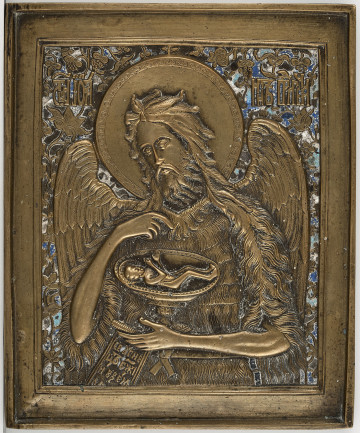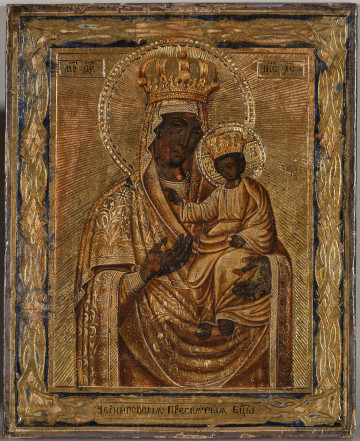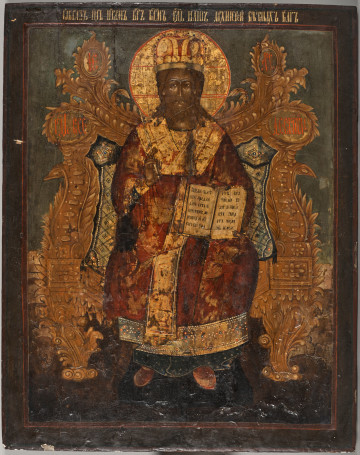
St. John the Baptist
20th century
Castle Museum in Łańcut
Part of the collection: Icons
In Byzantium and in the lands of former Rus, the mystery of the Incarnation of Christ was depicted in the icon of the Theotokos of the Burning Bush. From the middle of the 16th c. until the 20th c., instead of the depiction of Theotokos Panagia - the Sign (see S.12825MŁ, S.12826MŁ), the depiction of Theotokos Hodegetria had appeared in such icons (see S.12677MŁ). The Mother of God with the Son is placed against the background of an eight-pointed star, described under S.12769MŁ, S.12815MŁ; on the presented icon, she is surrounded by winged Cherubs. They embody Heaven, which lauds the Incarnate God and His Virgin Mother. These figures are taken both from Biblical texts and from canonically unconfirmed apocryphal works. Their arrangement is sometimes differently interpreted in individual icons of the Burning Bush. The prophecies and events of the Old Testament, in which Christian tradition sees the foretelling of the virginal Conception by the Mother of God, the Incarnation, and the Nativity of of Christ, supplement the symbolic-allegorical content in the corners of the icon. These are: on the top left - Moses before the Burning Bush, embodying the Most Holy Theotokos and the mystery of Incarnation (Exodus 3:1-5); on the bottom left - Ezekiel before the gate from the vision of New Jerusalem (Ezekiel 40:5-49); on the bottom right - the ladder with angels leading to Heaven, seen by Jacob in a dream (Genesis 28:12-1); on the top right - Tree of Jesse, the father of King David, which shows the royal descent of Christ (Isaiah 9:1-10). The presented icon is an example of casting art, widespread among the Old Ritualists, who did not accept the liturgical reform of the Moscow Patriarch Nikon in the years 1652-1856, used objects of worship of their own making exclusively. Teresa Bagińska-Żurawska https://orcid.org/0000-0002-9243-3967
Other names
Burning Bush Mother of God
Dimensions
height: 10.1 cm, width: 9 cm
Object type
Icons
Technique
cast, enamelling
Material
brass, varnish enamel
Origin / acquisition method
decyzja administracyjna
Creation time / dating
Creation / finding place
Owner
Castle Museum in Łańcut
Identification number
Location / status

20th century
Castle Museum in Łańcut

19th (?) century
Castle Museum in Łańcut

1800 — 1850
Castle Museum in Łańcut
DISCOVER this TOPIC
Museum of King Jan III's Palace at Wilanów
DISCOVER this PATH
Educational path